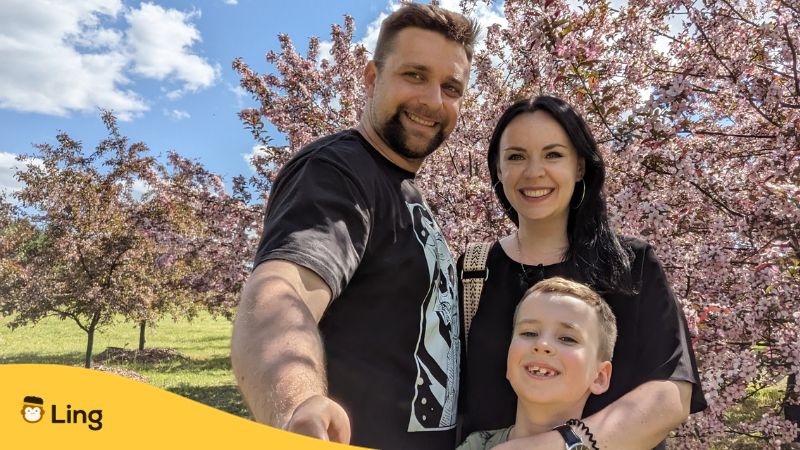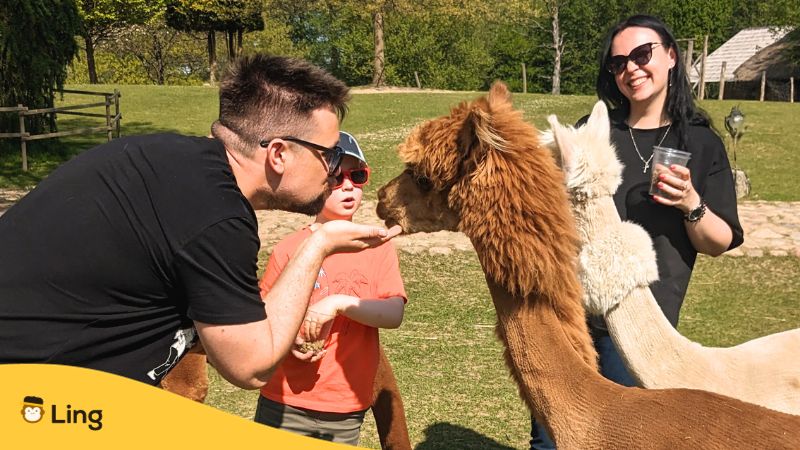As we delve into the experiences of our app’s users, we recently had the opportunity to connect with Kazimira in our podcast. She shared her inspiring journey as an expat learning Lithuanian, navigating the nuances of a new language and culture.
As an expat, Kazimira understands the importance of learning the local language to connect with people, but she also knows the challenges learners face. She told us all about the obstacles she’s found on her path to learning Lithuanian and how she manages to overcome them daily, sharing helpful advice along the way.
So, if you’re studying the local language of the country you live in, or any other for that matter, read along. You’ll get to know her personal language learning story and how the Ling app has been able to lend a hand.
From Belarus To Lithuania: A Journey Towards Fluency
Hailing from Belarus, Kazimira made the life-altering decision to relocate to Lithuania with her family. She firmly believes that living in a foreign country, she should make an effort to learn the local language, and it’s this mindset that motivated her to take on Lithuanian.
Kazimira, whose native language is Russian, teaches English and Italian. As a teacher, she’s no stranger to the complexities of learning a new language, especially considering she has also studied French and German. But Lithuanian proved to be quite a challenge.
The languages she had previously learned share many linguistic features, but Lithuanian has many peculiarities, as it belongs to an entirely different language family. She mentioned, for example, having difficulty with the stress in the syllables, as it’s really different from all the languages she knows.
Over a year into her Lithuanian learning journey, Kazimira admits to still struggling, and doesn’t feel nearly as confident as she does when speaking English. But she’s not giving up any time soon, that’s for sure.

Lithuanian Language Challenges: Finding Motivation In Daily Life
When talking about her struggles learning the language, Kazimira tells us that locals would frequently answer in English or Russian upon hearing her struggle in Lithuanian. Some have even laughed at her attempts to communicate in their native tongue. Of course, this was disheartening, but she didn’t let these speed bumps deter her. Instead, she used them as learning opportunities.
She was honest with us: “To tell the truth, it stops me for some time,” she says, but “after thinking through, after running through all these small details in my head, I am stubborn. And after some time, I want to show off; I want to show everybody that I can do it so that I won’t be laughed at my pronunciation next time.”
It’s encouraging to hear how much she wants to prove to native speakers that she’s capable of using the language. “I guess that’s my stubbornness that motivates me,” she says while laughing.
This tendency of native speakers to switch to Russian or English, be it to try to help or because they don’t have much patience, deprives her of much-needed practice. Waiters are usually more helpful, she says with a laugh, because oftentimes they expect a tip. Nevertheless, she feels very proud when managing to have a conversation in Lithuanian with them.
Sometimes, these situations affect her motivation to keep a regular study routine. If native speakers switch to English or Russian, what’s the point in trying to communicate in their language?
But she tells us that it’s about what she believes. “Even if they don’t need it that much, I believe that I need it. I would feel more confident.” So, it’s more of a personal choice for her rather than a necessity, which makes her perseverance all the more impressive.
Small victories keep Kazimira motivated day-to-day. She finds value in the little things, like successfully formulating a sentence in Lithuanian or receiving compliments on her accent, which serve as positive reinforcement.
When asked if she was scared to use the language after arriving in the country, she tells us that was very much the case. “I was afraid I wouldn’t be able to buy milk!” she recalls, “because the packages are very different from the country that I’m from, and I don’t know the words for milk.”
“I was very stressed,” she continues, “very nervous. I was saying many scary things to my husband. He had to go and buy milk! But,” she goes on, “then I got braver, I learned the words, and now I can buy milk! I’m proud!” she says, laughing.
It’s this perseverance that has marked her journey. Kazimira insists that a “one step at a time” attitude is key for aspiring learners. Mistakes are part of the process — “You will make mistakes, you should make mistakes, it’s normal. So, continue, stay positive, be brave” are her encouraging words.

Kazimira’s Lithuanian Language-Learning Adventure And The Ling App’s Role In It
Kazimira tells us it’s rather difficult to find apps and even good teachers to learn Lithuanian, so when she found the Ling app, she decided to join. She goes to the app whenever she has time and says it definitely helps with her learning.
She stresses that small and consistent steps are key on the path to language mastery. Her core advice echoes perseverance: “It’s better to do something than to do nothing.”
And the Ling app has been very helpful in that regard. She mentions using the app is “easy-peasy and very convenient,” as it’s always available. It has been a valuable asset on her learning journey.
But Wait, Is It Possible To Become Fluent In Lithuanian?
Reading about the obstacles Kazimira has faced, you might be wondering if fluency in the Lithuanian language is possible. And the answer is yes! You can certainly become fluent in Lithuanian with consistent practice, some immersion in the language environment, and a dedicated learning approach. As Kazimira’s story shows, the journey to fluency can be challenging, but it’s achievable with the right resources and perseverance.
Now, as a teacher, Kazimira has an interesting take on the importance of tests as a learning resource. “Usually, tests are associated with something bad and stressful. But I think that the more revision you have, the more tests you have, the more results you will have. So I find tests very helpful.” Curiously, this complements the words of another one of our users, who also emphasized the value of re-examining what has been learned.
Kazimira’s experience shows the significance of good learning resources, whether apps or traditional grammar books, which she also uses. However, she underscores the importance of going out to speak with the locals, as practice is essential when mastering a new language.
Perseverance And Consistency: Keys To Lithuanian Language Learning
Language mastery takes a lot of work. Sometimes motivation is scarce, and we stop using the Ling app for a few days. We’ve all been there, haven’t we? But Kazimira’s advice is strong: “Stay consistent, even if you haven’t studied for some days, it’s still in your head. And if you continue, it will lead to something.”
She reminds us not to feel upset for stopping at some part of the way, because it happens to everybody: “All the learners of any language need to be kinder to themselves and not to punish themselves for mistakes or possible pauses in a learning process.”
As she says, you just need to give yourself some time. It’s normal to have different speeds when learning a new language, so take her advice and don’t feel discouraged.
Are You An Expat Learning Lithuanian? The Road To Lithuanian Language Mastery
Through Kazimira’s language learning success story, we can see the complexities involved when aiming for fluency. Mastering a new and unfamiliar language requires patience, resilience, much practice, and the willingness to overcome the challenges along the way.
As such, there is much to learn from her experience. Language learners like her show us that perseverance is the key to results, but it’s easier when good resources, like the Ling app, lend a hand.
Kazimira’s commitment to learning Lithuanian, aided by her confidence and persistence, is nothing short of remarkable. As her journey continues, we take the solid advice she gave us, reiterating a simple but powerful phrase: “Continue, stay positive, be brave.”
Moving to Lithuania as a foreigner or already living there? How are you adapting to life in Lithuanian? Share your story and language-learning journey with us in the comments below!


































































